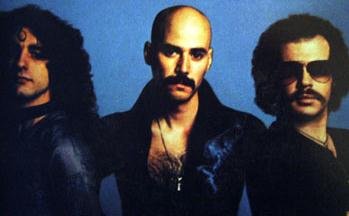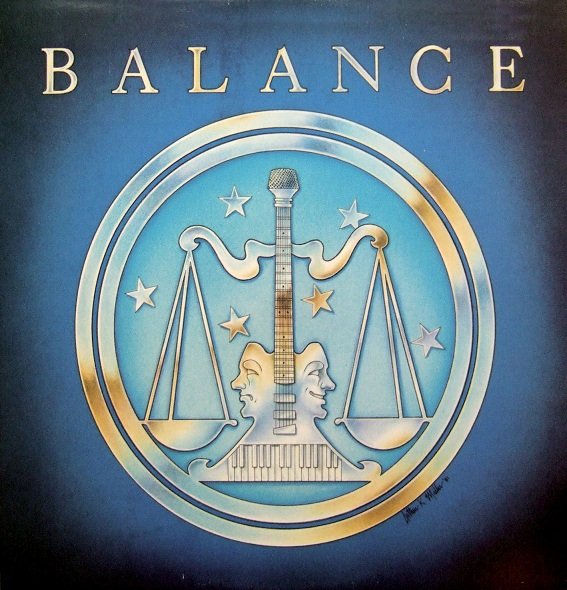BALANCE - S/T: Looking For The (AOR) Magic - And Finding It
AOR bands seem to exist on two tiers. The top tier is the obvious hitmakers that sold singles and albums by the truckload during the genre's heyday. Foreigner, Journey, Styx, Boston, etc. all fit in this camp. The second, lesser-known tier consists of bands who might have a minor hit but vanished after a short while, leaving abbreviated legacies of recordings that become obsessed over by the genre's devoted fans. The former camp is the most accessible but the real AOR magic often lies in the latter camp - and Balance is a fine example of a band from that second, rarefied tier.The core of Balance consisted of Peppy Castro, Bob Kulick and Doug Katsaros. Castro had scored some hits in the late 1960's while fronting the Blues Magoos and continued to gig through the 1970's in lesser-known outfits. Kulick was a busy session guitarist whose work included some uncredited lead-guitaring on a few Kiss recordings (he's also brother to 80's-era Kiss guitarist, Bruce Kulick). Katsaros was a keyboardist and another session pro whose credits included work on Paul Stanley's 1978 solo album, which also featured Kulick and Castro. This was a collective with talent to burn. Together, they formed a precision-tooled unit that crafted a pair of AOR cult fave albums before disbanding. Cultists tend to favor the second album, which has a harder-rocking edge, but their first album is just as compelling for genre fans. The group defines their style on the opening cut, "Looking For The Magic": guitars and keyboards form a multi-layered alloy over a steady midtempo beat while Castro's impassioned vocals give it a focus. Elaborate vocal harmonies by Castro and Katsaros add an ear candy x-factor that puts it all over the top.That basic formula of sounds remains a constant throughout Balance but the group adds fresh musical ideas throughout the running time to keep things interesting. For instance, "No Getting Around My Love" applies the group's AOR sleekness to a boogie-rock melody and groove out of the Status Quo playbook and "Haunting" offsets its piano-pounding verse melody with a stripped-down chorus built on solo piano and delicate falsetto vocals. The best example is "Breaking Away," a winning little tune that mixes rock riffs and a pop melody with a danceable groove anchored by a prominent drum-machine pattern (this was the album's minor hit single).
Together, they formed a precision-tooled unit that crafted a pair of AOR cult fave albums before disbanding. Cultists tend to favor the second album, which has a harder-rocking edge, but their first album is just as compelling for genre fans. The group defines their style on the opening cut, "Looking For The Magic": guitars and keyboards form a multi-layered alloy over a steady midtempo beat while Castro's impassioned vocals give it a focus. Elaborate vocal harmonies by Castro and Katsaros add an ear candy x-factor that puts it all over the top.That basic formula of sounds remains a constant throughout Balance but the group adds fresh musical ideas throughout the running time to keep things interesting. For instance, "No Getting Around My Love" applies the group's AOR sleekness to a boogie-rock melody and groove out of the Status Quo playbook and "Haunting" offsets its piano-pounding verse melody with a stripped-down chorus built on solo piano and delicate falsetto vocals. The best example is "Breaking Away," a winning little tune that mixes rock riffs and a pop melody with a danceable groove anchored by a prominent drum-machine pattern (this was the album's minor hit single). Fans who appreciate the pomp-rock element of AOR will also find plenty to enjoy on Balance: "American Dream" suffuses the pounding, hard-rock arrangement with soaring strings and a delicate keyboard intro and "I'm Through Loving You" is a high-energy pop rocker that sustains an impressive level of forward drive on the back of a dual-layered riff that fuses chiming synths atop chugging guitars. "Fly Through The Night" is another winner in this vein, developing from a classical-styled keyboard motif into a Zep-riffed slab of pomp-rock topped off with vocal-harmony frills.If there's a criticism for this debut, it's that a few of the less-experimental tunes try a little too hard at being radio-ready: "Falling In Love" is a heart-on-sleeve ballad that pumps the sugary sweetness up to near-diabetic levels and "Hot Summer Nights" tends toward the generic in its attempts to be a crowd-pleasing pop-rocker. That said, both tunes are bursting at the seams with the hookiness and craftsmanship that AOR fans crave.In short, Balance is a strong, cohesive debut album. If classic, cultish AOR is what you want, this dishes it up with all the trimmings. Genre fans will want to hunt down the Rock Candy reissue, which boasts a handsome remastering job and a killer set of liner notes that draw heavily from new interviews with the band.
Fans who appreciate the pomp-rock element of AOR will also find plenty to enjoy on Balance: "American Dream" suffuses the pounding, hard-rock arrangement with soaring strings and a delicate keyboard intro and "I'm Through Loving You" is a high-energy pop rocker that sustains an impressive level of forward drive on the back of a dual-layered riff that fuses chiming synths atop chugging guitars. "Fly Through The Night" is another winner in this vein, developing from a classical-styled keyboard motif into a Zep-riffed slab of pomp-rock topped off with vocal-harmony frills.If there's a criticism for this debut, it's that a few of the less-experimental tunes try a little too hard at being radio-ready: "Falling In Love" is a heart-on-sleeve ballad that pumps the sugary sweetness up to near-diabetic levels and "Hot Summer Nights" tends toward the generic in its attempts to be a crowd-pleasing pop-rocker. That said, both tunes are bursting at the seams with the hookiness and craftsmanship that AOR fans crave.In short, Balance is a strong, cohesive debut album. If classic, cultish AOR is what you want, this dishes it up with all the trimmings. Genre fans will want to hunt down the Rock Candy reissue, which boasts a handsome remastering job and a killer set of liner notes that draw heavily from new interviews with the band.


